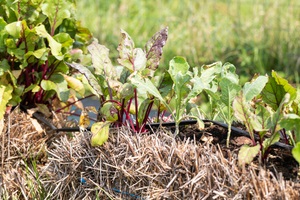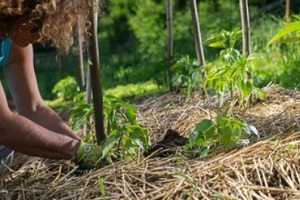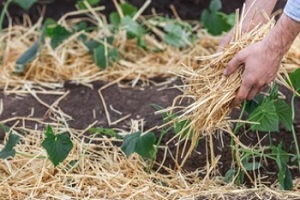 When it comes to improving your soil, there are lots of approaches that can be used. However, one of the most affordable and effective methods is often overlooked: straw. Using straw as mulch in your garden works surprisingly well for protecting plants from weeds and drought while improving the soil. Here is a closer look at the benefits.
When it comes to improving your soil, there are lots of approaches that can be used. However, one of the most affordable and effective methods is often overlooked: straw. Using straw as mulch in your garden works surprisingly well for protecting plants from weeds and drought while improving the soil. Here is a closer look at the benefits.
It Can Help To Reduce Weeds
Using straw mulch as ground cover can deter weeds from growing when it is used correctly because it blocks sunlight from reaching the weeds. Place it around your plants using a layer that is 3 to 4 inches deep as this will allow the mulch to stop weeds from growing while still enabling your plants to thrive. Be sure to do this after removing any existing weeds from your garden bed.
If you have already seeded your vegetables, take care not to lay straw on top of your seedlings or seeds. Apply it everywhere else you can see exposed ground.
Keep in mind, however, that you will need to monitor the amount of straw mulch you have in your garden throughout the growing season. A typical garden climate can cause straw to decompose and compost quickly. This is very beneficial to the soil, but you will need to add more mulch from time to time to make sure you still have a layer of 3 to 4 inches thick to prevent weeds.
It Can Help Keep Your Plants Disease-Free
Soil often has diseases that can transfer to the plants you are growing, such as early blight. However, because straw mulch absorbs rain and stops water from bouncing back up onto the leaves of your plants, it can keep soil-based illnesses from transferring to your plants while limiting the number of moisture-related diseases that can affect them, such as blossom rot.
Mulch essentially serves as a barrier between plants such as vegetables and soil to discourage disease. Straw also has the effect of keeping fruit from touching the soil, which keeps it cleaner and reduces the amount of washing you’ll need to do before you can consume your harvest.
Thick straw mulch also helps encourage the growth of plants like squash, watermelons and pumpkins, giving it a clean blanket upon which it can grow unblemished.
It Helps Your Plants To Retain Moisture
 Bright sunlight in the middle of summer can cause moisture in your soil to evaporate rather quickly. However, mulch does a good job of keeping water in the soil so your plants can make use of it. The Old Farmer’s Almanac says that it may even allow you to water your garden once a week instead of every day or two. Moreover, it refers to straw mulch as “gold” for those living in areas experiencing rainfall shortages and droughts.
Bright sunlight in the middle of summer can cause moisture in your soil to evaporate rather quickly. However, mulch does a good job of keeping water in the soil so your plants can make use of it. The Old Farmer’s Almanac says that it may even allow you to water your garden once a week instead of every day or two. Moreover, it refers to straw mulch as “gold” for those living in areas experiencing rainfall shortages and droughts.
It Protects Your Garden Beds From Temperature Fluctuations
Straw’s coarse texture enables it to trap air, insulting the soil and protecting your garden beds from normal temperature fluctuations. In addition, its porous nature means it can help moisture seep down into your soil.
It Can Be Used To Make Cold Frames
Straw works well for making quick and easy cold frames to grow transplants and hardier seedlings such as kale, cauliflower and broccoli. Bales of straw can be used to create an enclosed frame and something else can be placed on top, such as an old window, to create a sort of miniature greenhouse in your garden. You can create a good-sized cold frame with just six straw bales, placing two end to end on each side with one bale at each end.
How To Choose Straw For Mulch
When you are using straw for mulch, you want to ensure that it is generally seed-free or it could introduce weeds into the garden rather than help eliminate them.
It is also important not to confuse straw with hay. Straw is a byproduct of the production of grain and consists of the stem of the grain plant that remains after it has been mowed and threshed. Straw generally does not contain any seeds. Think of it as what has been left behind after oats, barley and wheat have been threshed.
Hay, on the other hand, is one or more types of grass that have been cut and dried to be used as animal feed. It often contains seeds and seed heads, making it unsuitable for mulching a garden.
Look for chopped straw as a shorter length will allow it to break down more quickly and make it easier to arrange it around existing plants.
How To Spread Straw In Your Garden
Make sure that you spread straw at least two inches deep for proper moisture retention, temperature control and weed suppression; 3 to 4 inches thick is ideal, however. When you are spreading your straw, be sure you pull it back from the base of your plants so that it is not resting up against the stems. As a general rule, if you can see any bare soil through your straw, you need to add more.
If you have any leftover straw, be sure to keep it in a dry area so it does not decompose. This additional straw can be used later to replenish your mulch as it decays over time, or you can use it to cover empty beds in the winter.
 Straw is not considered a very aesthetically pleasing mulching material, which means it is generally reserved for use in vegetable gardens. However, if you want to enjoy its excellent mulching properties in an ornamental bed, you could always cover the straw with a thin layer of a more visually pleasing type of mulch, such as bark chips.
Straw is not considered a very aesthetically pleasing mulching material, which means it is generally reserved for use in vegetable gardens. However, if you want to enjoy its excellent mulching properties in an ornamental bed, you could always cover the straw with a thin layer of a more visually pleasing type of mulch, such as bark chips.
You should also keep in mind that straw can become quite heavy when it is wet, so keep your bales near the area you will be using them to avoid having to move them later.
Get In Touch With Dirt Connections
Straw mulch is easy to apply and offers great environmental benefits, so consider using this affordable type of mulch in your garden to keep it healthy. When paired with high-quality soil, you can set your garden up for the best chance of success. For all of your gardening needs, get in touch with the experts at Dirt Connections to arrange soil delivery throughout the Northern Virginia area.
Summary

Dirt Connections was started with one goal in mind: providing quality residential and commercial construction services to clients on time and on budget. Reach out for more information on how we can support your next project.
For your convenience our estimates are free and by appointment. Call 703-940-9949 for a free estimate today!










































